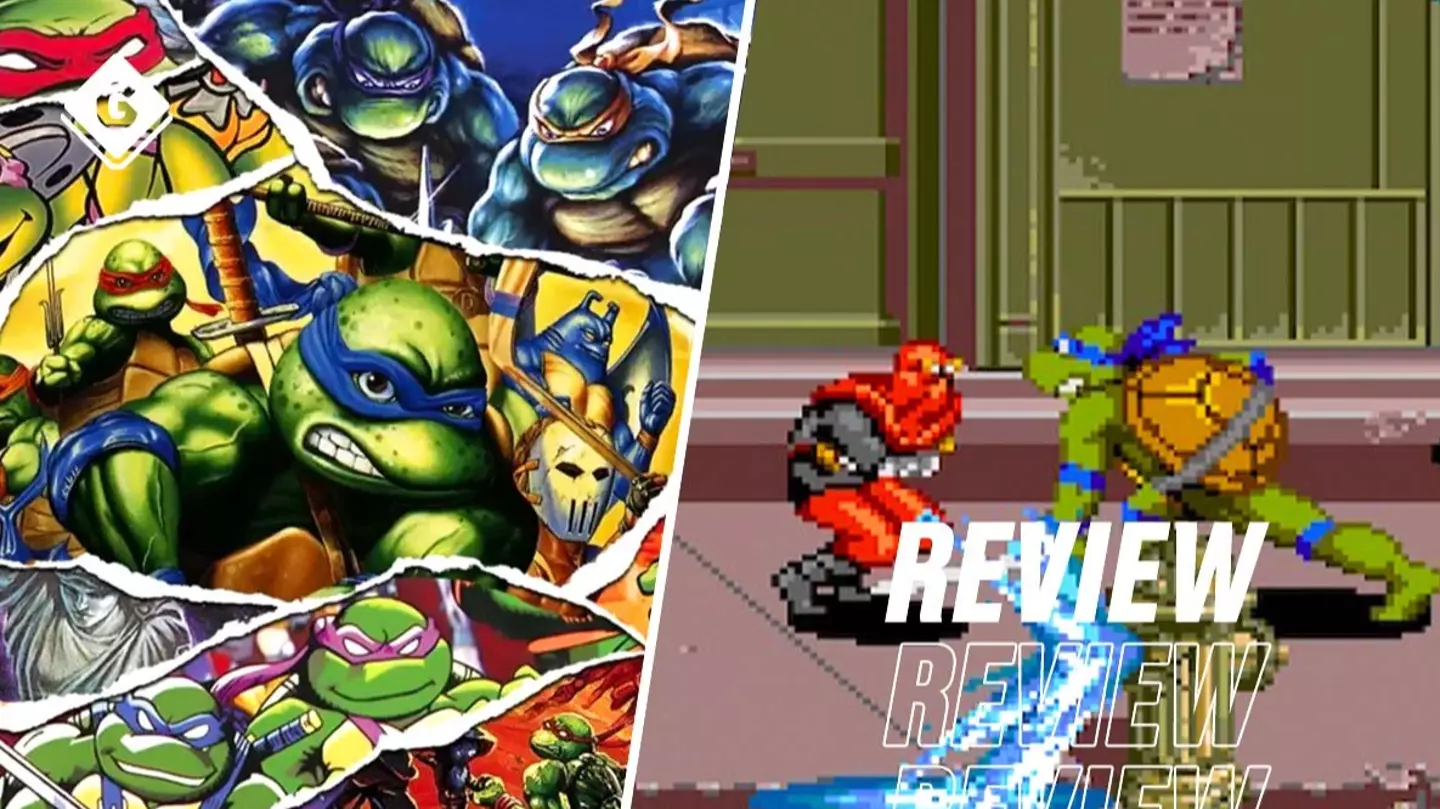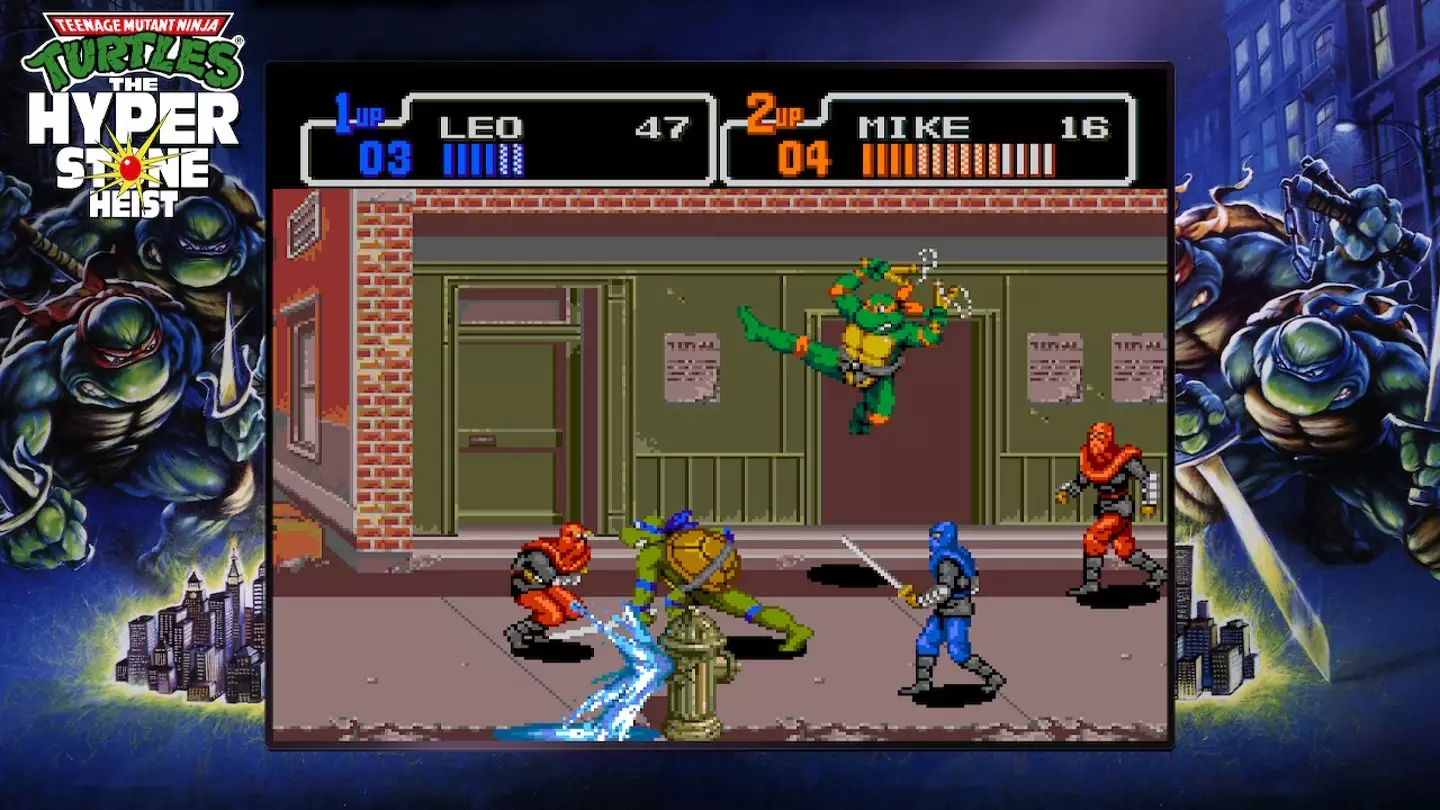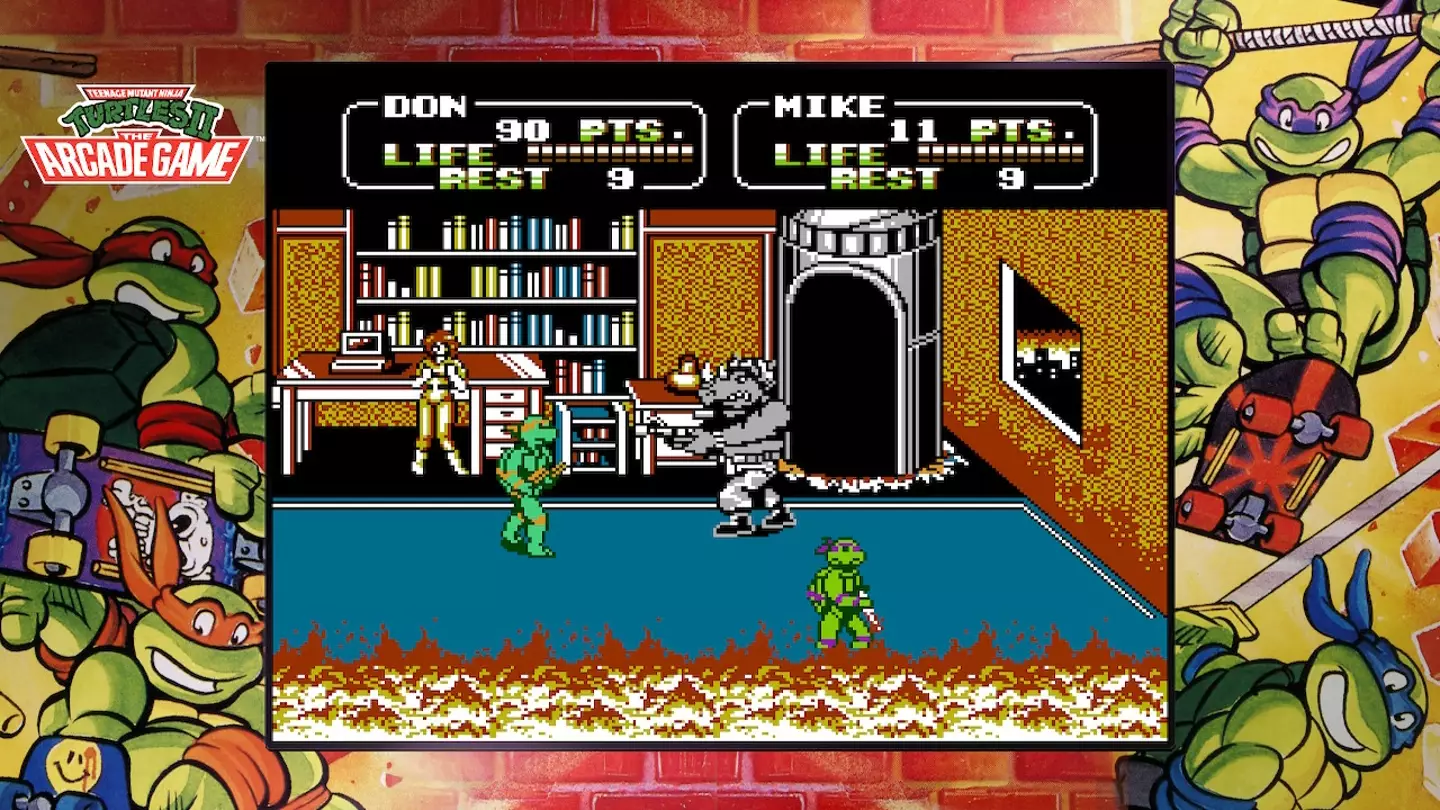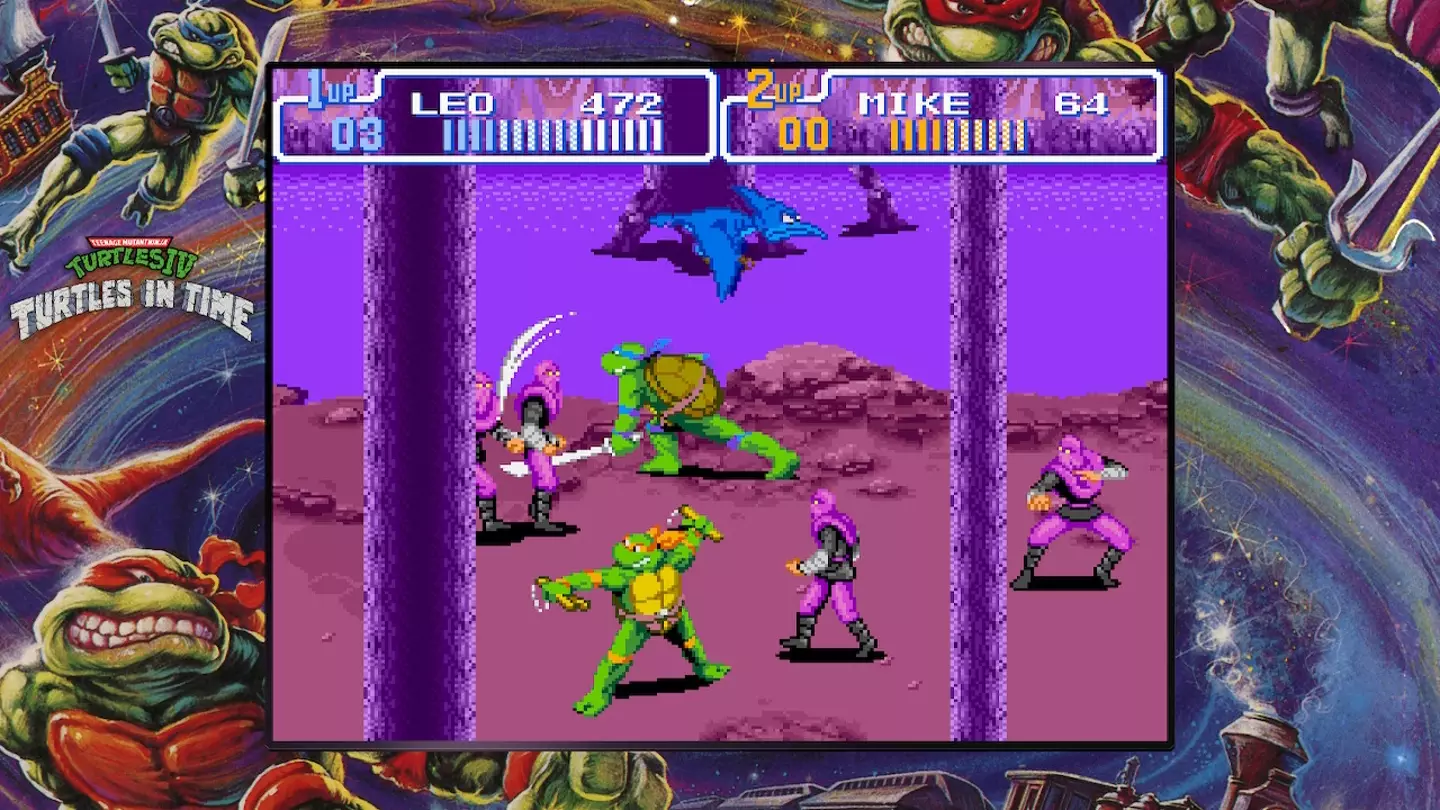
As June 2022’s exceptional Teenage Mutant Ninja Turtles: Shredder’s Revenge showed, the arcade beat ‘em up genre is enjoying a righteous revival right now, with some absolute classics of the belt-scrolling kind coming out long after many a grey-haired player assumed the style was done and dusted. We’ve had Jitsu Squad, Young Souls, River City Girls, Streets of Rage 4 and more of late, all delivering the immediate thrills and blood-pumping action of the 1980s and ‘90s but with a healthy slug of sizzlingly fresh features. And if Shredder’s Revenge was the shot in the arm that the famously pizza-loving Turtles needed in the gaming space, here comes the chaser: a 13-game collection of Konami’s 8-, 16-bit, handheld and arcade releases.
Watch a trailer for The Cowabunga Collection below…
The Cowabunga Collection is compiled and modernised by Digital Eclipse, with the California-based studio evidently pouring plenty of love into proceedings. Before we get to the games, first comes the presentation: and from its animated intro (title song included, of course) onwards, this is a high-quality package when it comes to contemporary bells and whistles. Every included game features some form of enhancement, with players able to select from a small set of screen filters and borders to suit their eyeballs. Beyond that comes gameplay adjustments, like ‘god modes’, playable bosses, level selects, extra or infinite lives and more, all depending on what title you’re looking at. Every game has a rewind feature too, allowing you to undo that mishap and hold onto a life otherwise lost - if you want to use it, as none of these quality-of-life options are defaulted to active or forced upon the player.
Advert
Then there’s the Turtle’s Lair, a library of comic book covers, design notes and concept drawings, advertisements and marketing material, original box art and manuals (very nice), television episode stills and music from every game to listen to. There’s strategy guides for each game - also accessible in the pause menu - which provide handy hints and tips for anyone who’s struggling or simply wants to make the most of the title in question; and in a nod to the huge amount of content in this section there’s a filter option so you can go straight to what you’re looking for. For fans of the heroes in their half-shells, this is fantastic stuff - and even those with a more lukewarm appreciation of Eastman and Laird’s comic creations (NGL, that’s this guy, right here) will love rummaging through what Digital Eclipse has included.

Onto the games themselves and from the coin-op corner of video gaming history we have the original 1989 Teenage Mutant Ninja Turtles and its 1991 sequel, Turtles In Time. Both were excellent for the era they released in, albeit best enjoyed with friends (both support four-player local co-op and online play, although at the time of writing no online testing was possible), but they lack a certain bite and crunch when compared to the better games that have come since - although that’s something that can be said for most so-called classics of yesteryear (Streets of Rage 2 admirers, I accept your actually exception). There’s something quite imprecise about your nunchaku and katana blows, as they never connect with satisfying visual feedback. It’s the Mega Drive’s The Hyperstone Heist of 1992 - itself somewhat based on Turtles In Time and its thoroughly decent SNES port (Turtles IV, also here) - that’s probably the best traditional side-scrolling beat ‘em up here, Konami’s debut game for the 16-bit SEGA system showcasing the studio’s (then) mastery of instant-click arcade play.
The only other Mega Drive game here is Teenage Mutant Ninja Turtles: Tournament Fighters, a title that also shows up in its SNES and NES guises and probably shines the brightest on Nintendo’s own 16-bit hardware, although each is its own distinct game. Personally I never felt that the Turtles brand lent itself to one-on-one, Street Fighter II-style games, and The Cowabunga Collection’s inclusion of this trio does nothing to change my mind - while the SNES game is the best of the three, mostly due to its extra inputs, it doesn’t hold an anchovy to the best throwback fighters from Capcom, SNK, Midway et al. But, as always, your mileage will vary, and if you loved these back in the day, here they are looking better than ever and now with new options and features.

All three (original, monochromatic) Game Boy games - Fall of the Foot Clan, Back from the Sewers and Radical Rescue - make the Cowabunga cut, and of the three it’s the last to release, 1993’s Radical Rescue, that’ll hold newcomer attentions the most, replacing the 2D side-scrolling combat of its predecessors with more of a Metroidvania approach. Allowing nostalgia to overwhelm better judgement, I love playing through the Fall of the Foot Clan from 1990 (simply titled Teenage Mutant Ninja Turtles in Japan - and where there is a Japanese release available, you can switch to that ROM here), but it’s a supremely short affair, beatable in under 30 minutes. Remember, though, that the Game Boy was the platform for short-session games, and Foot Clan was a titan of its time with its detailed visuals capturing the character of the comics and cartoon and its theme tune well-enough realised in bleeps and bloops.
Advert
Its late-lifespan release of 1993’s Tournament Fighters already noted, the NES is represented by three more games: Teenage Mutant Ninja Turtles of 1989 (not great, but hugely popular), 1990’s conversion of the original arcade game, and 1991’s third entry, The Manhattan Project. Perhaps it’s my slight 8-bit SEGA bias showing - I was a Master System kid, only playing NES games at pals’ houses - but none of these do it for me. But again, the beauty of this collection is that the Turtles game you did love is likely to be here, and if you’re overwhelmingly enamoured with the added levels of that middle Nintendo release, more power to you. I’ll stick with the actual arcade game.

I’ve not played every game here to its end, so I can’t say with absolutely, unfaltering, bet-the-farm-on-it certainty that the emulation is flawless throughout, but everything I have witnessed in The Cowabunga Collection has played smoothly, responded promptly, and been free of bugs or crashes. If you’re planning to pick this up after Shredder’s Revenge expecting more of the same, please, allow me to pause your purchase for a second - these are bare bones indeed after that moreish delight, so buy knowing that you’re getting improved-feature-set versions of much older games, with save-anytime (one slot per game) functionality a real plus, but they are still much older games. Then again, if you’ve the truest Turtle power in your veins, you already know what this is all about and you pre-ordered it ages ago.
Pros: wonderful presentation, wide array of added features, Turtle’s Lair is a treat for fans, evidently made by people who personally care for the material
Advert
Cons: not one of the included titles is a real best-in-genre experience, screen filters on the Game Boy games could have been made more handheld-specific, some default controls feel weird (but are easily remapped)
For fans of: Turtles, arcade beat ‘em ups, video game console history
8/10: Excellent
Teenage Mutant Ninja Turtles: The Cowabunga Collection is released on August 30 2022 for Nintendo Switch (version tested), PlayStation 4 and 5, Xbox One and Series X/S consoles, and PC. Review code provided by the publisher. Find a guide to GAMINGbible’s review scores here.
Featured Image Credit: KonamiTopics: Konami, Nintendo Switch, Retro Gaming
